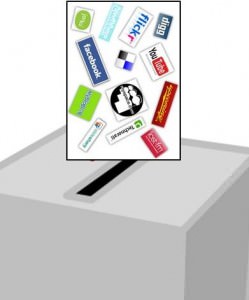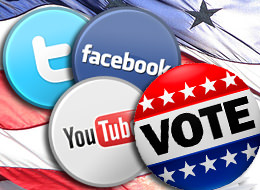Social Media: An Essential Ingredient for Modern Democracy?
Online social platforms experience success in the political realm
@davemorin: The future of political media is social.
By: Ellie Chan, Staff Writer
If the founding fathers of the United States were told that a little bird could start an upheaval and democratize a country, they would never give the idea a thumbs up. Yet, social media is about more than about untagging yourself from photos or following Justin Bieber; it is a revolutionary way to connect and communicate, enabling oppressed voices to be heard. It was true during the Arab uprising, and it is increasingly true for Western governments. Social networks are slowly becoming a building block in the modern face of democracy.
Without doubt, these social platforms do not have any legal power to oust dictators, but they can certainly shake things up by uniting the population together at the speed of a click. In the beginning of 2011, a Tunisian shopkeeper set himself on fire; then, an entire nation rose up because it shared his frustrations and fatigue with authoritarian rule. After Tunisia successfully toppled its dictatorial government, people across North Africa and the Middle East put aside their fears, risked everything, and protested against their own regime.
[pullquote]Muammar Gaddafi, the former autocrat of Libya, banned soccer as the revolution swept into his country. He liked the sport, but feared a stadium gathering… By the time Arab leaders recognized social media as the virtual stadium, it was too late.[/pullquote]
At the height of the Egyptian movement, pictures and videos of the collective power located at Tahrir Square spread like wildfire on the Internet, and quickly gained international awareness and support. When Hosni Mubarak, the Egyptian leader, lost his throne, hope was extended to Algeria, Bahrain, Iraq, Jordan, Libya, Morocco, Oman, Syria, andYemen, sparking a civil war and major demonstrations.
What occurred is written down in history. It is a historical fact that Facebook, Twitter, and Youtube have successfully mobilized people to take action for democracy. These social platforms are not merely tools for communication; they are a multiplier of sentiment, accomplishing goals at a faster rate and on a larger scale.
It was social media that enabled people to i) synchronize their views, ii) coordinate action in a split second, and iii) document and publicize activities. In the light of groups of disconnected and disaffected individuals who seek change but lack the power, social networks are neutral, cheap, and easily accessible spaces where groups with similar opinions can come together. When a solitary person realizes that there are tens, no, hundreds, no, thousands, no, millions of individuals who share the same beliefs, an empowering force is born, one that is feared by governments. After all, politicians are not afraid of opinionated people; they are afraid of a collective group with synchronized views.
Muammar Gaddafi, the former autocrat of Libya, banned soccer as the revolution swept into his country. He liked the sport, but feared a stadium gathering. He would use every measure possible to avoid public gatherings where people could synchronize their beliefs and coordinate their action. By the time Arab leaders recognized social media as the virtual stadium, it was too late.
In 2011, the January 25 demonstration in Cairo was initially coordinated by youth on Facebook. It began with a courageous group of fifty, marching from a mosque in the Mohandiseen neighbourhood. They were outnumbered by the police force. Tweet by tweet, the group grew from 50 to 2,500 to 10,000 strong, protesting at Tahrir Square, engulfing the police. The march did not start as a political movement; many of those who first participated thought it would be another small demonstration. However, what began as a small gathering slowly evolved into a revolution that overthrew a 30-year rule. Today, anyone can coordinate actions within a moment, like the youths in the London riots and the Philadelphia flash mob. For good or for bad, social media made this possible.
 Many academics are presently debating whether a “Twitter Revolution”, a social network for social change, actually exists; however, whatever the outcome of the debate may be, the exciting thought of Twitter tumbling an entire political regime instils new hope in many nations, including the U.S. When Barack Obama was battling the deadlock in the U.S. Congress to raise the debt ceiling before a historic sovereign default, the president started a Twitter campaign to rally his country.
Many academics are presently debating whether a “Twitter Revolution”, a social network for social change, actually exists; however, whatever the outcome of the debate may be, the exciting thought of Twitter tumbling an entire political regime instils new hope in many nations, including the U.S. When Barack Obama was battling the deadlock in the U.S. Congress to raise the debt ceiling before a historic sovereign default, the president started a Twitter campaign to rally his country.
One week before the August 2 deadline, Obama, with 9.4 million followers on Twitter, tried to pressure the Republicans to a compromise. The president, himself, tweeted: “The time for putting party first is over. If you want to see a bipartisan #compromise, let Congress know. Call. Email. Tweet. – BO”.
[pullquote]Social media has unequivocally become an essential ingredient in modern democracy.[/pullquote]
The Americans called. They bombarded the Capitol switchboard and it operated at near capacity. The Americans tweeted. They spammed their representatives with the hashtag to #compromise. Obama spammed too. Over the period of one day, Obama posted more than 100 tweets, giving out more than 230 Twitter handles (or usernames) of Republican lawmakers.
Some liked the campaign, but the overall failure was too apparent. Obama lost an estimated 40,000 followers whose Twitter feeds were flooded by his spam tweets.
@Matt9383: I don’t think @BarackObama understands that sending out massive amounts of tweets in a short period of time is really annoying.
@the_real_cwurst: I just have to feel that @BarackObama’s 9.3M followers are pretty pissed right now that he’s demolishing their feed. Inconsiderate.
@lukeneff: I did the math. It’s going to take @BarackObama six and half hours to get through all the states at this rate.
Success belonged to another Twitter hashtag during the U.S. debt crisis. Jeff Jarvis, a journalism professor at the City University of New York, started the #F***YouWashington trend that has won him a hoard of new followers. Initially wanting to vent some anger, he tweeted: “Hey,Washington assholes, it’s our country, our economy, our money. Stop f***ing with it.” After discovering it was a common feeling, he followed by saying, “People, it’s time to get f***ing pissed off.” And then, “Can we start a Twitter chant: F*** YOU, WASHINGTON! Pass it on.” The hashtag blew up to 20,000 tweets in an hour and more than 36,000 in a day. The network site tried to block the hashtag from trending due to profanity, and it kicked Jarvis off for tweeting too much. But Jarvis’ absence did not matter, because society adopted the trend and continued the conversation. A big speech bubble was created, containing the true voices of disappointed Americans, and if democracy means what it initially promised, these people need to be heard. Social media, once again, made it easier for the government to do just that. The question is whether politicians have the will to listen.
A NEW DEMOCRACY IS CHIRPING
Social media has unequivocally become an essential ingredient in modern democracy. It is indisputable that these media platforms have a strong hold on our daily lives, and they are tightening their grip. The rawness and immediacy of available information encourages more transparency, and we see from the Arab Spring that absolute monarchy struggles to cope with 21st century technology. Now, a larger network of citizens possess a voice that is louder than before, and it is increasingly harder to effectively ignore and oppress them. It will become more difficult for dictating elites to remain elite, to pass power to family members, and suspend democratic constitutions. We may not realize it in the Western world, but this is a significant step towards democracy. “[C]losing options for authoritarian rule has been an important part of democratization. Giving a dictator less room to manoeuvre is as much a part of democratization as is running the first successful election.”, wrote Philip N. Howard, author of The Digital Origins of Dictatorship and Democracy: Information Technology and Political Islam.
It is a long race. There are still many hurdles ahead before these countries can ensure a lasting change. Social media cannot lay down the foundations for political, social or economic reforms, but it has provided us a virtual salon(like those inEuropebetween the 16th-18th centuries) where conversations and sharing of ideas can be translated into action that leads to a significant change.
In the case of the U.S. debt crisis, although Obama and his staff reaped minimal benefits from the Twitter campaign, it opened the world to the possibility of a new model of leadership. Social media possess the power to drive public mobilization and citizen engagement. The nation can be heard in a new way, and we are encouraged to question the traditional method of linking the government with its people and vice versa. This is the future of democracy.
ARB Team
Arbitrage Magazine
Business News with BITE.
Liked this post? Why not buy the ARB team a beer? Just click an ad or donate below (thank you!)
Liked this article? Hated it? Comment below and share your opinions with other ARB readers!































Share the post "Social Media: An Essential Ingredient for Modern Democracy?"